項目名稱: 上海張家浜楔形綠地規(guī)劃設計
主持主創(chuàng): 林選泉?劉月琴
獲獎情況: 國際競標專家推薦方案
??????????2009年第八屆上海國際青年建筑師設計作品展二等獎
項目地點: 上海浦東
項目面積: 363公頃
作品發(fā)表:《從概念到建筑――2009年第八屆上海國際青年建筑師設計作品展集粹》
???????????2009大連理工大學出版社�,林選泉?劉月琴
?
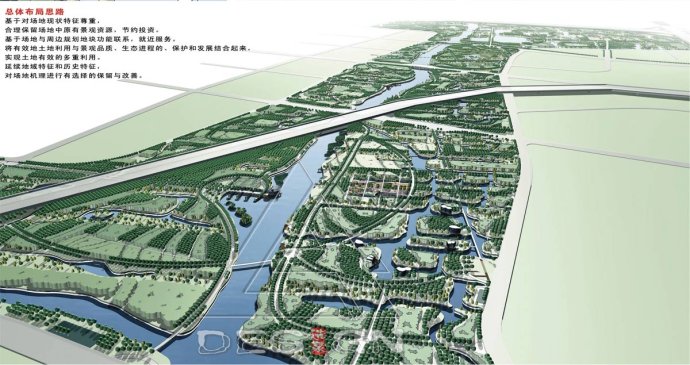
總體構想與目標
Overall concept and goal:
生態(tài)生產(chǎn)休閑結(jié)合的城市“綠肺”
The city’s “green lung” with ecology, production and leisure activities
?
張家浜楔形綠地位是上海市8片楔形綠地之一�,規(guī)劃面積3.6平方公里。設計遵循“生態(tài)����、休閑”原則,基于對場地所承載功能的理解�����,以“生命綠葉”為理念����,充分利用場地的優(yōu)勢資源對其改造,用景觀產(chǎn)業(yè)化等景觀策略對場地的13個功能區(qū)域進行規(guī)劃設計����,在島群的重點功能區(qū)將綠地的生態(tài)、生產(chǎn)���、休閑功能結(jié)合起來�����,創(chuàng)造浦東郊區(qū)田園風光�����。最終使楔形綠地成為一個集排蓄防洪�����、生態(tài)保護教育��、休閑游憩為一體的城市“綠肺”�����。
?
As the one of eight wedge-shaped green spaces in Shanghai and with the area of 3.6 square kilometers, zhangjiabang wedge-shaped green space is planned on the principle of ecology and leisure activities. Based on the understanding of the site function and the concept of “l(fā)ife’s green leaves”, we took full advantage of the superior resources, made thirteen functional districts planning by applying the landscape solutions, and also organized the ecological, productive and social activities of the green space in key areas to create a wonderful Pudong suburbs nature sight. At last, the zhangjiabang wedge-shaped green space is aimed to become a city’s “green lung” with all functions of water store and drainage, flood prevention, ecological education and recreational activity.
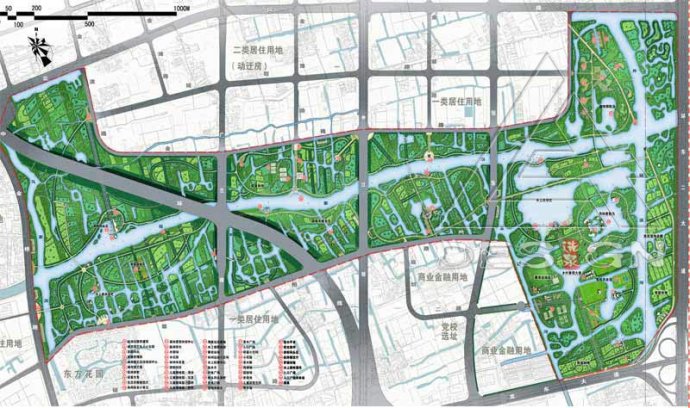
?
功能定位
Functional localization
生態(tài)教育���、生態(tài)保護���、排蓄防洪、休閑游憩���、郊野公園
Ecological education, ecological protection, water store and drainage, recreational activity and rural park
 
?
規(guī)劃理念
Planning concept
與自然過程相和諧的當?shù)匦缘脑O計
A local design in accordance with the natural process
?
我們?nèi)∠笥谝黄挥猩Φ娜~子�,當然也不僅僅停留在形的模仿�,而是對于其“神”,生命體的有機構成的理解�。通過將場地中主要的河流以及一些水系的溝通,建立枝狀的的濕地水系�,構建起一個能量傳遞的系統(tǒng),內(nèi)部的也是外部的�����,而其中的一些活動斑塊如建筑�、小島就象其中的細胞,充滿生命力���。
We made the plan with a seed full of life as the tool, not in order to imitate but express our understanding of the life constitution. ?Through the connection between some main rivers and water, we build a coherent wetland system, both interior and exterior, and some architecture and islands full of activities are like its energetic cells.
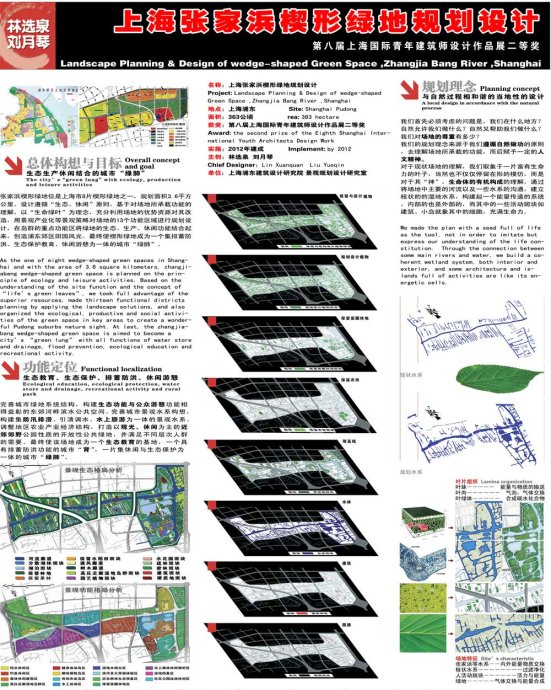 ? ?
?
總體布局思路 General layout ideas
合理保留場地中原有景觀資源��,節(jié)約投資
Reasonably reserve the original landscape resources on the site to save investment
將有效地土地利用與景觀品質(zhì)���、生態(tài)進程的保護和發(fā)展結(jié)合起來
Combine the effective land-use with the protection and development of landscape quality and ecological processes
實現(xiàn)土地有效的多重利用
Effectively realize the multiple use of the land
延續(xù)地域特征和歷史特征
Extend the regional and historical characteristic
對場地機理進行有選擇的保留與改善
Selectively reserve and improve the site texture
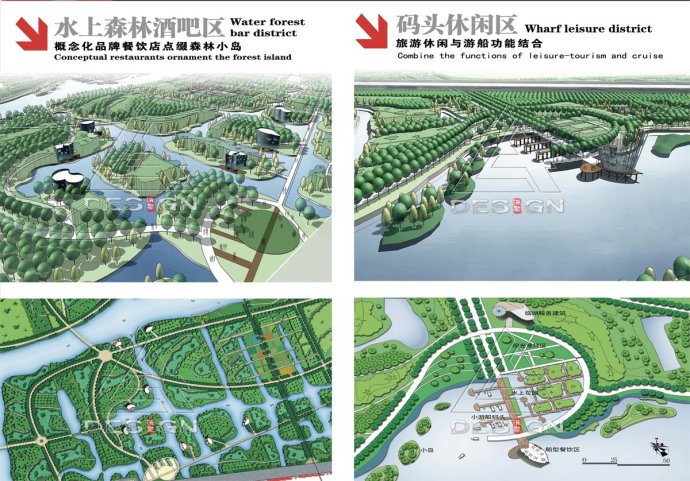
水上森林酒吧區(qū)? Water forest bar district
概念化品牌餐飲店點綴森林小島
Conceptual restaurants ornament the forest island?
碼頭休閑區(qū)
Wharf leisure district
旅游休閑與游船功能結(jié)合
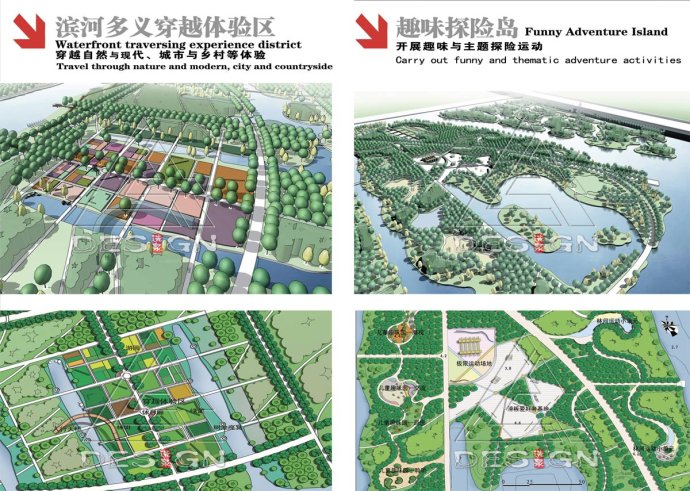
?
濱河多義穿越體驗區(qū) Waterfront traversing experience district
穿越自然與現(xiàn)代、城市與鄉(xiāng)村等體驗
Travel through nature and modern, city and countryside
趣味探險島
Funny Adventure Island
開展趣味與主題探險運動
Carry out funny and thematic adventure activities
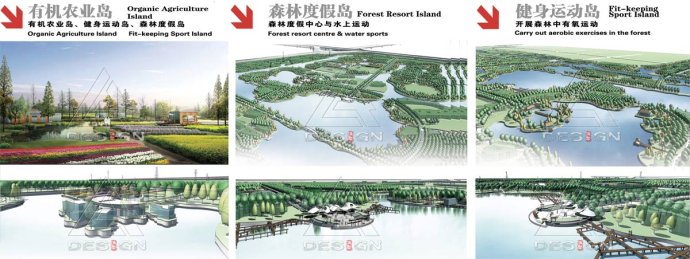
?
各功能區(qū)實施思路 Implement ideas of the districts
從城鄉(xiāng)一體化的角度���,提高其景觀多樣性
Improve the landscape diversity from the perspective of urban-rural integration
將綠地的生態(tài)功能與生產(chǎn)�����、休閑功能結(jié)合起來
Combine the ecological function of the green land with its production and?leisure function
合理處理保護與開發(fā)的關系��,在保護的前提下��,促進開發(fā)
Properly handle the relationship between protection and development�, promote development on the premise of protection
體現(xiàn)浦東新區(qū)郊區(qū)郊野田園風光
Reflect the suburban rural scenery in Pudong New District
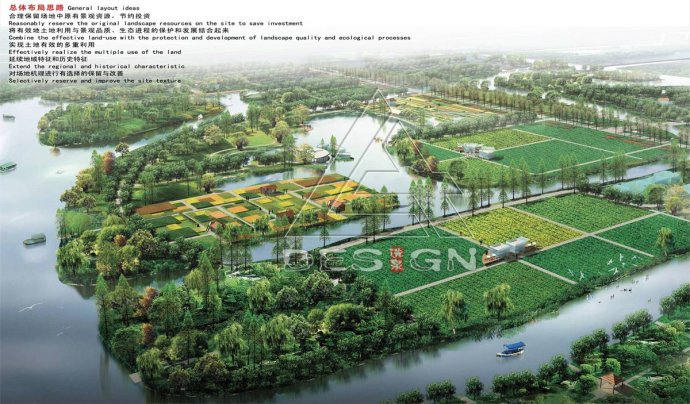
?
?
近期開發(fā)島群深化 Deepening the recent development of the island group
有機農(nóng)業(yè)島���、健身運動島�����、森林度假島
Organic Agriculture Island
Fit-keeping Sport Island
Forest Resort Island
?
人對自然的溯求與生俱來�。有生態(tài)學家認為:人從自然中來��,必然要回到自然中。郊區(qū)游憩的熱度升起�����,必然帶動城市郊區(qū)游憩帶的發(fā)展����,只是該場地的要求必定要加上一個生態(tài)承載力的問題。
People are born with the demand for nature. Ecologists claims:People come from nature and will return to nature inevitably.
The booming of the countryside recreations will drive the development of suburban recreation belt which requires the consideration of its ecological capacity
? 
|
 信息產(chǎn)業(yè)部網(wǎng)站備案:滬ICP備13040278號-1
信息產(chǎn)業(yè)部網(wǎng)站備案:滬ICP備13040278號-1
 滬公網(wǎng)安備 31011502003788號
滬公網(wǎng)安備 31011502003788號






 ?
?





